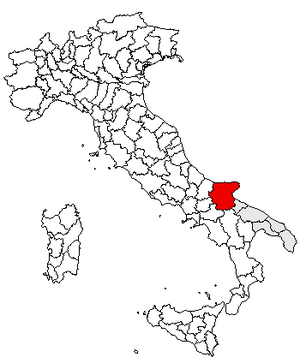Second Battle of Herdonia
Coordinates: 41 ° 19 ′ 0 ″ N , 15 ° 38 ′ 0 ″ E
| date | 210 BC Chr. |
|---|---|
| place | Herdonia (now Foggia ), in Italy |
| output | Carthaginian victory |
| Parties to the conflict | |
|---|---|
| Commander | |
| Troop strength | |
| less than 20,000 men | about 25,000 men |
| losses | |
|
allegedly 12,000 |
few |
Saguntum - Lilybaeum II - Rhone - Ticinus - Trebia - Cissa - Lake Trasimeno - Ager Falernus - Geronium - Cannae - Nola I - Nola II - Ibera - Cornus - Nola III - Beneventum I - Syracuse - Tarentum I - Capua I - Beneventum II - Silarus - Herdonia I - Upper Baetis - Capua II - Herdonia II - Numistro - Asculum - Tarentum II - New Carthage - Baecula - Grumentum - Metaurus - Ilipa - Crotona - Large fields - Cirta - Zama
The Second Battle of Herdonia was a skirmish between the Romans and the Carthaginians around 210 BC. In the Second Punic War.
prehistory
The Roman Empire had already suffered defeats at Trebia, Lake Trasimeno and Cannae, and the willingness of Rome's allies to fight began to wane. In addition, the Samnites and other Italian peoples began to rebel against the domination of the Romans. As for Gnaeus Fulvius Centumalus , the Roman consul from 211 BC. BC, now needed, was a victory that restored respect for Rome and weakened the Carthaginian army. For these reasons he had the city of Herdonia besieged with his five incomplete legions , which had been conquered by Hannibal two years earlier .
The battle
Hannibal had already been informed of the arrival of the Romans, he had posted a superior force of warriors in the city. And he knew of the high spirits of the proconsul Centumalus. So he let his infantry step out of the south gate, knowing full well that the Romans would attack immediately, which they then did. As was the case with Roman cities, Herdonia also had four gates, one in each direction. Through one of these side gates he let his Numidian horsemen break out, who fell in the rear of the Roman army. The battle lasted only a short time, after the death of Centumalus most of the men lost courage and they fled the battlefield. The Carthaginians pursued the refugees and killed many of them. The survivors ran to Marcellus' camp .
consequences
This defeat had fatal consequences for Rome, not only because of the deaths of so many Romans, but also because of the political unrest in the country, which now broke out more and more. The Roman survivors were assigned to the Legiones Cannenses as a punitive transfer.
See also
swell
- Titus Livius 27, 1, 4-15
- Appian , Hannibalica 48
- Plutarch , Marcellus 24, 2
- Sextus Iulius Frontinus , Strategmata 2, 5, 21
literature
- Hannibal, and the Enemies of Rome by Peter Connolly , 75--75
- Hannibal, Enemy of Rome by Leonard Cottrell, ISBN 978-0-03-030720-1 , p. 175f
